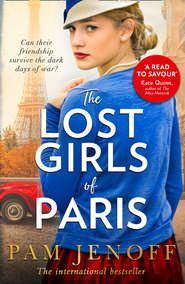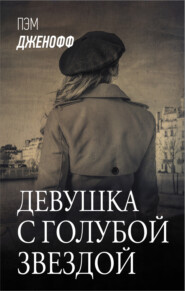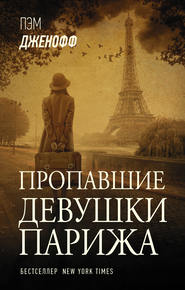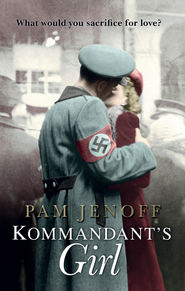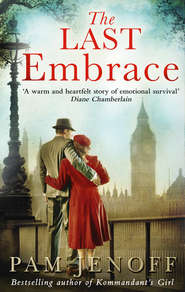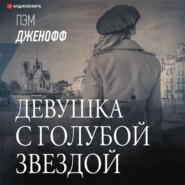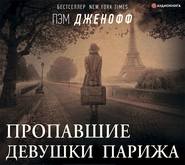По всем вопросам обращайтесь на: info@litportal.ru
(©) 2003-2025.
✖
The Winter Guest
Автор
Год написания книги
2018
Настройки чтения
Размер шрифта
Высота строк
Поля
6 (#ulink_548b3e16-2aff-5e2b-b66b-add8c5c530cb)
After Helena disappeared into the forest, Ruth set Karolina down to play with wooden blocks by the fire and busied herself cleaning up the breakfast dishes. When she finished, she dried her hands and opened the cupboard. In the back, exactly as Mama had kept it, was the glass jar of honey. Ruth had discovered the jar when she was eight, and Mama (whose sweet tooth was her one weakness) had shared a bit with her in exchange for keeping it a secret. Ruth dipped a finger in it now and then put it in her mouth, the familiar sweetness a reminder of happier times. How wonderful it had been to have something that was just hers, instead of split between her and Helena. Guilt surged through her. She should share it with the children, a rare treat for all of them. But then it would be gone. It was all right to keep this one thing as hers alone, wasn’t it? Better for them not to get used to such things, anyway, when they likely would not have any more.
Checking on Karolina, who was still playing contentedly, Ruth poured a cup of coffee and carried it to the seat by the window. The wind whistled, seeping through the cracks. Outside Michal and Dorie continued to run, undeterred by the cold. As Ruth looked around the cottage, a sense of foreboding overcame her. “Things are changing,” Helena had observed cryptically the previous evening. Why did she say this as though it were a good thing? Ruth had liked the old world with its seasons and predictable expectations. Now everything was topsy-turvy, uncertain.
She shifted uncomfortably, thinking of Piotr. The memory of his face had grown fuzzy in her mind since the last time he’d come to see her. She had taken the time that morning to roll her hair into a fine braided knot. “Ruth, you look like a princess!” Dorie had exclaimed. Touched, Ruth had glowed with a bit of nearly forgotten pride. “Princess” was Dorie’s highest honor, and one she had only bestowed on Mama—until now.
Piotr had appeared across the field from town at one o’clock, as he had each Sunday, head bowed low against an autumn wind. He was not bad looking, Ruth had reflected. Taller than her by a head and broad-shouldered, he had thick features and colorless blond hair. Balled in one hand was the scarf she had knitted for him and she wondered why he wasn’t wearing it. She might have kept it for Christmas and given it to him as a gift, but she’d wanted him to have it exactly for days like this.
“Cze´s´c.” He greeted her with an awkward kiss that did not quite reach her cheek. She waited for him to notice her hair, but he did not remark upon it.
“Shall we walk?” she asked, speaking a bit more quickly than usual. Their courtship had been unremarkable, consisting mostly of strolls by the stream when the weather permitted it. “Or would you prefer to come in and warm up by the fire?” He did not answer but peered uneasily over her shoulder. It was the others, she decided. Piotr was an only child and more comfortable around a calf or foal than human little ones.
Ruth put on her cape and followed him outside in the direction of the stream. The water was low, pulled back to reveal dry muddy banks littered with pebbles and branches. A mossy smell rose from the muck. The stream would swell again when the snows came and melted, then rise perilously with the spring rain showers. She pointed to a bend in the stream, just beyond the edge of their property. “Helena says that is a fine place for catching trout. Perhaps in the spring...”
Piotr stopped and turned to her abruptly. “I can’t. That is, my father doesn’t want me to come anymore.” He faltered, face reddening like a beet.
“I don’t understand.” Her stomach burned ominously.
“Things are going so poorly with the farm. And now there are the quotas.” He was referring to the percentage that the Germans now exacted from each farmer’s yield. The sisters’ own garden was too small to offer much, but from a farm like Piotr’s, the demand would be severe. “There isn’t enough to support a family.”
It was a lie, of course—she and Helena managed to feed the children with so much less. But he was offering it as a reason—an excuse, really—as to why they could not go forward. Ruth watched him, contemplating what to do, which smile or touch might cajole him to change his mind. She’d learned from observing Mama how to charm a man into doing what she wanted. A few minutes ago he was just an ordinary boy; now he was all she had, and she was suddenly desperate to keep him.
“The war has just made things so difficult,” Piotr began again. He broke off and thrust the scarf in her direction so quickly that it fell to the ground, then he stomped off in the opposite direction with a gait too clumsy to be a run.
She took a step forward, stumbling over a tree root. “Piotr!” Her voice echoed against the stillness of the trees. It was not until he had disappeared across the field that she realized he would not be coming again.
Staring at the emptiness before her, so new and yet so permanent, Ruth recalled how just a week earlier he had kissed her behind the barn. She had pushed his fumbling hands away, partly because it was the right thing to do, and also because once she gave him that, he would no longer want her. But he had left her, anyway. Had Piotr broken off things because she had let him go too far, or because she had stopped him?
Neither, she decided now, gazing out the window at the very spot where their courtship had ended. It had not been about sex, but money. Piotr’s family just didn’t want to be saddled with supporting so many children who were not their own. Piotr’s mother had undoubtedly told him to get rid of dead wood while he still had the chance, that Ruth and her family would never be anything but a burden. But if Piotr had been a stronger man, he would have stayed in spite of his mother’s opinion—and for that weakness Ruth hated him most of all.
Piotr had begun courting the liveryman’s daughter, beautiful and unencumbered by anyone, just three weeks later, confirming Ruth’s suspicions. Her cheeks burned now as she relived the rejection. It wasn’t so much Piotr she missed, Ruth reflected. She hadn’t really wanted to go live in his big cold house on the other side of town, and there was a roughness to his touch that had made her dread what lay ahead. No, it was the idea of him, the now-gone promise of having a place secured, which filled her with a sense of loss.
Worst of all that day, she’d had to return to the house to face Helena. Though she had not said a word, her sister’s expression indicated that she’d known it would end poorly all along. She did not want to accept Helena’s sympathy—or acknowledge the fact that they were the same again, alone without anyone.
There was a knock at the door. Ruth started, setting down her coffee cup so quickly that a bit splashed high over the edge onto the table. No one came calling unannounced, or at all these days. For a fleeting second she thought that it might be Piotr, conjured from her thoughts. Perhaps he had come to beg her forgiveness and tell her that he had made a mistake. She would take him back, if his apology was sincere, although not right away. She had given things too easily before, a mistake she did not intend to repeat. But of course, Piotr was off fighting somewhere. Helena, she decided. She must have come back for something and forgotten her key—again.
Ruth opened the door, then stepped back at the sight of an unfamiliar woman whose dark hair was streaked with silver. Though she did not wear the yellow star, something about her shawl suggested that she was a Jew, from a neighboring village, perhaps. “Tak?”
The woman did not speak, but looked over Ruth’s shoulder, assessing the house, which despite its modest size and furnishings must have seemed luxurious. Ruth cringed, wondering if for a moment the woman would ask for food or money, or worse yet, shelter. They had nothing extra to spare and letting the woman in would surely invite trouble. She noticed that the woman wore no gloves or hat, but seemed oblivious to the cold. “Can I help you?” Ruth asked more softly. Karolina toddled up behind her, tugging at the hem of her dress. Ruth lifted her protectively.
“My child,” the woman croaked, her voice younger than her careworn face might have suggested. Was the woman deluded and thinking that Karolina was hers? Ruth hugged the child tighter to her breast. “I have a little girl.” The woman held her hand up to just below her waist. “Wearing a red plaid scarf with an eagle on it. Have you seen her?”
For a moment, Ruth thought she must have misunderstood, for who misplaced a child? But the woman’s eyes, ringed with circles from her not having slept or rested in her search, were sincere. “I’m sorry, I haven’t.” She eyed the woman. She had only seen Jews from afar, dark, mysterious creatures that seemed to confirm Father Dominik’s admonitions in his sermons that they were shrewd and cunning and drank the blood of Christian infants. But the woman before her just looked like any mother, tired and bedraggled and desperate.
“They said a camp...” the woman began feebly, and before Ruth could ask, the woman turned and started off across the hill.
“I’m sorry,” Ruth said again into the empty space before her, with more feeling than she had expected. Though the woman might look different, a child was a child, and Ruth could not help but pity her. Still, Ruth had her own family to think about and could not afford to become involved.
She closed the door and sat down with Karolina on her lap, shaken by the lingering image of the woman’s face. They knew families that had lost children in the traditional sense, born too small or taken by influenza or some other illness—not the odd way this woman had just described. She had seen the grieving mothers at market with their hollow eyes, disbelieving, despite the odds, that it had happened to them. The merchants seemed to speak softly and cut more generously for those women, but other villagers stepped back, as if the loss might somehow be contagious. Ruth’s throat tightened. She would take the squabbling and competition and hardships of a large family if it meant that they were safe—and together.
Suddenly anxious, Ruth rapped on the window, gesturing for Michal and Dorie to come inside. “Take your boots off,” she instructed, closing the door quickly behind them. “I’ll warm some milk.” As she set Karolina in her high chair, she hoped they would not ask about the woman.
The children darted beneath the table and around the chairs, as though the colder weather had made them unusually restless. “Where’s Helena?” Dorie asked, seeming to notice her sister’s absence for the first time.
“She’s gone to the city,” Ruth replied absently.
“Nooo!” the child wailed, her face seeming to crumple. She swung her braids from side to side, tears streaming down her cheeks.
Ruth stopped in surprise, milk pitcher suspended midair. The children seldom noticed, much less minded, Helena’s absences. She set the pitcher down and knelt. “There, there,” she soothed, stroking Dorie’s hair. The child’s breath was improbably sweet like cinnamon. “She’ll be back by tonight. You’ll see. She’s only gone to visit Mama.” She usually refrained from mentioning their mother, not wanting to remind the children and cause them distress or answer their many questions. But now she added the information, hoping it would bring further plausibility to her explanation of Helena’s absence.
“You know Christmas is coming,” Ruth offered, trying to change the subject.
“Are we having a tree?” Michal asked.
“I don’t think so, darling,” Ruth said, a knife going through her as she watched his face fall. It seemed frivolous, cutting down a pine tree when there was so much else to worry about. “But we’ll have a lovely meal and all of the songs and stories.”
“And Mama?” Dorie looked up hopefully, eyes brightening. “Will she be back for Christmas, too? Did Helena go to get her?” Ruth understood then that for some reason today, Dorie had equated Helena’s going to the city with Mama’s disappearance, a trip was taken in one direction only. She imagined that Helena, too, wasn’t coming back.
“Mama,” Karolina repeated absently, asking for the mother she surely could not remember.
Inwardly, Ruth crumbled. This was the conversation she had been avoiding. “No,” she said gently, knowing that there was no way to avoid breaking Dorie’s heart again. She pushed a cup of milk toward her sister. “Mama needs to stay in the hospital where there are doctors and medicine that can make her feel better.”
“Just like we were playing outside, Dor,” Michal offered. Ruth braced herself for further questions about their mother’s recovery, tried to anticipate and come up with answers that were not quite lies but spared the child from the truth. But Dorie turned away and began playing with her rag doll on the floor.
“What were you playing outside?” Ruth asked, grateful to Michal for redirecting the conversation. When she and Helena were little, theirs were simple pretend games, like house and school. Ruth was always the mother or the teacher, taking charge in a way that now seemed prophetic.
“Hospital,” Michal replied. “Dorie’s the nurse. I was the patient and Dorie cured me.” She wondered what the unseen hospital life must look like in his mind.
“Doctor,” his little sister corrected quickly. “I’m going to become a doctor for real.”
Ruth started to tell Dorie that to be a doctor you need to go to school and then college, which would take money they did not have. That even under better circumstances, it would be nearly impossible for a woman. But Dorie’s eyes shone at the idea, a childlike dream not yet deterred by the war or realities of their situation, and Ruth would not take that from her. “That sounds wonderful.”
Dorie’s expression dampened. “Ruti, what are Nazis?” she asked, shifting topics without warning.
“Why do you ask?”
“I heard you talking to Helena about them.” Inwardly, Ruth sighed. She already knew better than to speak in front of Michal about matters from which she wanted to shield the children. But Dorie was getting older now, and speaking guardedly or spelling out words did not work anymore.
“They’re Germans, darling—German soldiers.” The last word—too good for them, really—stuck in her throat.
“Why have they come?” Dorie had a need to know why things were a certain way, how they worked, to scratch beneath the surface. It was a fierce intellect that in another time and place might have been nurtured to greatness. But Ruth did not know how to channel it, and after taking care of their basic survival needs, she seldom had the energy.
Ruth stopped, stymied by the impossibility of explaining war to children. Why indeed? “They want to be in charge. It’s all about politics and government. But they haven’t come to Biekowice so they won’t bother us.”
“But what about the Garzels?” Dorie had been outside playing when she and Helena had spoken of their neighbors’ disappearance. Had Helena told her about it? “Did the Germans make them leave the village?” Dorie persisted.
“Never you mind about the Garzels. Tend your own garden, as Mama used to say.” Karolina giggled from her high chair, as though Ruth had said something funny. Ruth wiped the milk that had dribbled onto her chin, then picked her up and set her on the floor by the fire.






